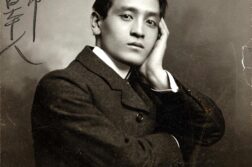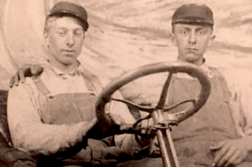ONE OF THE MANY THINGS I admire about Barack Obama is his willingness to admit his imperfections. “I am not a perfect candidate,” he is fond of saying, striking a chord of humility that makes him seem more human than most of our politicians. Obama wants us to know that he is fallible, yes, but not irreparably flawed.
After eight torturous years of a flawed administration that seems constitutionally incapable of admitting its own fallibility—even as it has presided over so many failures at home and abroad—it is refreshing to have a presidential candidate who can admit that he doesn’t have all the answers. So many of us are hungry to vote for a candidate who seems to understand that strong leadership requires an openness to new and different ideas, a willingness to grow and evolve, a capacity to learn from one’s mistakes. In light of the Bush Administration’s grotesque hubris, such humility seems almost revolutionary.
As a historian of 19th-century America, I am struck by how often Senator Obama invokes Abraham Lincoln as a model for this kind of leadership. Not only did he launch his 2008 Presidential bid from the steps of the Old State Capitol in Springfield, Illinois, where Lincoln once called on a “house divided” to heal itself, but in his finest moment to date—the “More Perfect Union” speech on race in America, which he delivered in Philadelphia on March 18, 2008—he also invoked both the U.S. Constitution’s noble if crippled commitment “to form a more perfect union” and as well Lincoln’s re-dedication to that task in the midst of the struggle over slavery that plagued the new republic and instigated the Civil War. It is common knowledge that Obama, like Lincoln before him, is a gifted politician, but when it comes to using history to inspire his “politics of hope,” the current senator from Illinois has clearly done his homework.
Obama’s fondness for Lincoln is instructive. Symbolically, there is something quite powerful about the fact that America’s first viable black presidential candidate feels a deep kinship—geographically, politically, and morally—with the president who issued the Emancipation Proclamation that made possible the abolition of slavery. Digging deeper, the real power of this connection derives from the fact that Lincoln himself was not born an abolitionist; he had to become one (tragically, this transformation was cut short before it was ever fully realized). Despite his longstanding opposition to slavery on moral grounds, Lincoln was in no rush to cause a ruckus, especially at such a precarious time in the history of the republic. But a ruckus he did cause. Lincoln was moved, if also sometimes maddened, by the forceful arguments of the abolitionists, who insisted that the rejection of slavery must be accompanied by a full embrace of racial equality. Lincoln was particularly influenced by his interactions with black abolitionists like Frederick Douglass, Martin Delany, Sojourner Truth, and Harriet Tubman—men and women whose counsel and company he both sought and respected. That Lincoln eventually became more progressive on a whole range of black civil rights issues—the abolition of slavery, the enlistment and compensation of black troops in the Union Army, even African colonization—was due, in no small measure, to the profound influence that African-American leaders had on him during his presidency.
The history of Lincoln’s gradual embrace of black civil rights—and Obama’s clear knowledge of, and respect for, this history—should be cause for optimism among people in the GLBT community. In addition to his rejection of all forms of prejudice and discrimination, Obama has staked out bold positions on a whole range of issues near and dear to queer people. He has co-sponsored legislation to expand federal hate crimes laws to include crimes perpetrated because of sexual orientation and gender identity. He believes that the Employment Non-Discrimination Act (ENDA) should be expanded to include both sexual orientation and gender identity. He supports the repeal of “Don’t ask, don’t tell” (1993) and the Defense of Marriage Act (1996), both of which were signed into law by President Clinton. He voted to oppose the Federal Marriage Amendment and would reject any attempt to stifle state efforts to legalize civil unions or gay marriage. He supports full civil unions that give same-sex couples the same legal rights and privileges as married couples. He supports comprehensive sex education, including the teaching of safe sex practices, and would oppose any attempt by insurance companies to discriminate against those who seek contraception. He supports Medicaid coverage for low-income, HIV-positive Americans, and has called for sharp increases in funding for hiv/aids research. He worked to re-authorize the Ryan White CARE Act and has been a vocal advocate for initiatives that deal with the global AIDS crisis. And he believes that the federal government should recognize state laws governing civil unions and same-sex marriages. Taken together, these progressive positions indicate that Obama is already very much “out” as an ally of our community. Historically speaking, he is far ahead of where Lincoln was on black civil rights when he first ran for president in 1860.
Obama’s leadership on our issues was made fully clear last summer, when he became the first presidential candidate from either political party to agree to participate in the historic Presidential Forum on GLBT issues co-sponsored by Logo and the Human Rights Campaign (six Democrats participated; all of the Republican candidates declined). With the important exception of “marriage equality”—which he, like every other major candidate, claims to oppose for religious reasons—Obama is one of the strongest supporters of gay rights in modern American political life. Certainly, no major presidential candidate before him has been a more vocal, visible, consistent, and reliable ally for our community.
In July 2007, I received an e-mail from the director of Obama’s New England field campaign inviting me to attend a meeting of GLBT leaders at Harvard Law School. I was surprised for two reasons: first, because I didn’t know how they got my name; and second, because it is uncommon for presidential candidates to seek the counsel of “controversial” constituencies so directly, and so early in the campaign season. Given all the recent hoopla over gay marriage—the deliberate, disgraceful campaign of anti-gay bigotry that helped to propel George W. Bush to a second disastrous term—I was shocked that any candidate would actually seek us out in 2008. Sure, Democrats in particular are famous for their obligatory one-shot appearances before minority or progressive organizations—what I like to call the “black church photo op”—but they usually schedule these for later in the campaign or during the political “off-season” between the primary contest and the summer convention.
So it was with a certain amount of skepticism that I returned to Cambridge from New York City to attend the “Obama queerfest,” as I playfully referred to it among my gay and lesbian friends. But what I encountered there was amazing: a room filled with young, diverse, energetic Obama field workers, meeting and greeting grassroots activists, progressive intellectuals, and elected political leaders from all over New England, many of them responsible for the recent historic successes in our civil rights struggle, such as civil unions in Vermont and New Hampshire, marriage equality in Massachusetts, non-discrimination statutes that include gender identity and expression, and the like. It was there and then that I began to understand that this was a very different kind of campaign, one more explicitly—and proudly—democratic (with a small “d”). The rhetoric was authentic.
A few days before the meeting, one of the field organizers running the event asked me to be a featured speaker. Never one to turn down an opportunity to “profess,” I obliged. Honestly, I don’t even remember what I said. Probably something about how, as an adopted son raised in a working-class family, I felt a certain kinship with Obama’s own background, as well as his broad conception of the nation as a place where every person deserves an equal place in the American “family,” and an equal shot at the American “dream.” I probably mentioned the fact that we share a similar education—Harvard and Columbia—for which we are both eternally grateful and from which we developed a deep commitment to public service. I talked about race and faith and religion and why I believe that Obama’s “improbable” candidacy has the potential to redefine American politics by dismantling the forty-year Republican stranglehold on the South. I ended by expressing my faith in this black candidate’s capacity to empathize more fully with the struggles that GLBT folks endure as similarly despised minorities in a country that has yet to achieve its full promise of equality.
Whatever I said, it seemed to go over well. After speaking at that event, I got several invitations to speak elsewhere—in New Hampshire, Massachusetts, and Rhode Island. Before I knew it, I was driving all over the place in my little 1996 Geo Prizm, speaking to undecided voters, both gay and straight, training college students to work for the field campaign, knocking on doors, holding signs, doing radio interviews, preaching to the converted, hosting election night parties, and sending everyone I know—friends, colleagues, students, family members—to work to get this man elected. I even started a blog (www.enterthetimzone.blogspot.com), much of which has been devoted to coverage of the campaign. I’ve been involved in political campaigns before, and I’ve spent much of my career researching, writing, and teaching about the history of social movements and political activism in the United States. But never before have I worked so hard to practice what I preach—to make history as well as to study it.
When it comes to GLBT issues, Barack Obama is not a perfect candidate. His acrobatics on marriage equality suggest that he has a capacity for calculation just like any other politician. But we cannot withhold our support because of one issue, as important as it is to so many of us. Indeed, perhaps the “marriage issue” raises another important question: can we condemn Barack Obama—or any other candidate, for that matter—for failing to embrace all the positions we hold near and dear when we ourselves have not yet achieved a consensus about what we believe? Many of us want the right to marry, but not all of us by any means. And as we witnessed all too clearly in the recent ENDA vote in Congress, our community still has its own internal debates about the politics and priorities of GLBT civil rights. In other words, we, too, are still struggling to form a more perfect union.
Notwithstanding his unfortunate recent gaffe about Obama’s “nuts,” civil rights icon Jesse Jackson was correct in saying that progressive change occurs whenever there is a combination of “an enlightened president and an energized electorate.” Together, we in the GLBT community, as with American voters in general, are as energized as we’ve been in recent memory. It remains to be seen whether Barack Obama will become the truly enlightened leader he seems to be. But if we continue to engage him in good faith, if we continue to press our demands on him, I am confident that he will become a more perfect candidate insofar as gay rights are concerned— a powerful straight ally who stands with us, rather than against us, in our ongoing struggle for freedom and equality. Together, Barack Obama and his queer supporters may just yet perfect this union.
Timothy Patrick McCarthy, a lecturer on history and literature as well as public policy at Harvard University, is a member of Barack Obama’s National LGBT Leadership Council.





